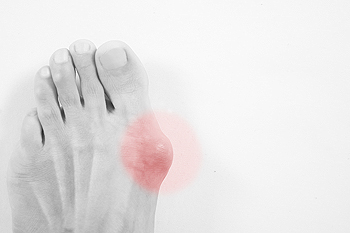Dallas (214) 340-8885
Athens (903) 677-9090
Gun Barrel City (903) 887-4341
Dallas (214) 340-8885
Athens (903) 677-9090
Gun Barrel City (903) 887-4341
 Bunions can be identified as a bony protrusion on the side of the big toe. This condition may develop for a number of reasons. Common causes may include wearing narrow or ill-fitting footwear, having an existing foot condition such as flat feet or low arches, the occurrence of a foot injury, inflammatory arthritis, or even genetic factors. Neuromuscular conditions, such as cerebral palsy may also influence the formation of a bunion. Symptoms that are often associated with a bunion can include redness, soreness, or a burning sensation linked to the affected area. It can also be common for hammertoes to form, as well as calluses, when bunions are present. To relieve the pain that is associated with bunions, it is suggested to wear shoe inserts to lessen the friction, as well as investing in proper footwear that leaves your toes adequate room to move freely in. For some cases, the symptoms of bunions may be severe, in which case, surgery can be the recommended option for treatment. In order to best determine how to care for your bunion, consult with a podiatrist as soon as possible for professional care.
Bunions can be identified as a bony protrusion on the side of the big toe. This condition may develop for a number of reasons. Common causes may include wearing narrow or ill-fitting footwear, having an existing foot condition such as flat feet or low arches, the occurrence of a foot injury, inflammatory arthritis, or even genetic factors. Neuromuscular conditions, such as cerebral palsy may also influence the formation of a bunion. Symptoms that are often associated with a bunion can include redness, soreness, or a burning sensation linked to the affected area. It can also be common for hammertoes to form, as well as calluses, when bunions are present. To relieve the pain that is associated with bunions, it is suggested to wear shoe inserts to lessen the friction, as well as investing in proper footwear that leaves your toes adequate room to move freely in. For some cases, the symptoms of bunions may be severe, in which case, surgery can be the recommended option for treatment. In order to best determine how to care for your bunion, consult with a podiatrist as soon as possible for professional care.
If you are suffering from bunion pain, contact Dr. Jonathan Kletz of Texas Foot Works. Our doctor can provide the care you need to keep you pain-free and on your feet.
What Is a Bunion?
Bunions are painful bony bumps that usually develop on the inside of the foot at the joint of the big toe. As the deformity increases over time, it may become painful to walk and wear shoes. Women are more likely to exacerbate existing bunions since they often wear tight, narrow shoes that shift their toes together. Bunion pain can be relieved by wearing wider shoes with enough room for the toes.
Causes
Symptoms
In order to diagnose your bunion, your podiatrist may ask about your medical history, symptoms, and general health. Your doctor might also order an x-ray to take a closer look at your feet. Nonsurgical treatment options include orthotics, padding, icing, changes in footwear, and medication. If nonsurgical treatments don’t alleviate your bunion pain, surgery may be necessary.
If you have any questions, please feel free to contact one of our our offices located in Dallas, Athens, and Gun Barrel City, TX . We offer the newest diagnostic and treatment technologies for all your foot care needs.
Make sure you enter all the required information, indicated by an asterisk (*). HTML code is not allowed.